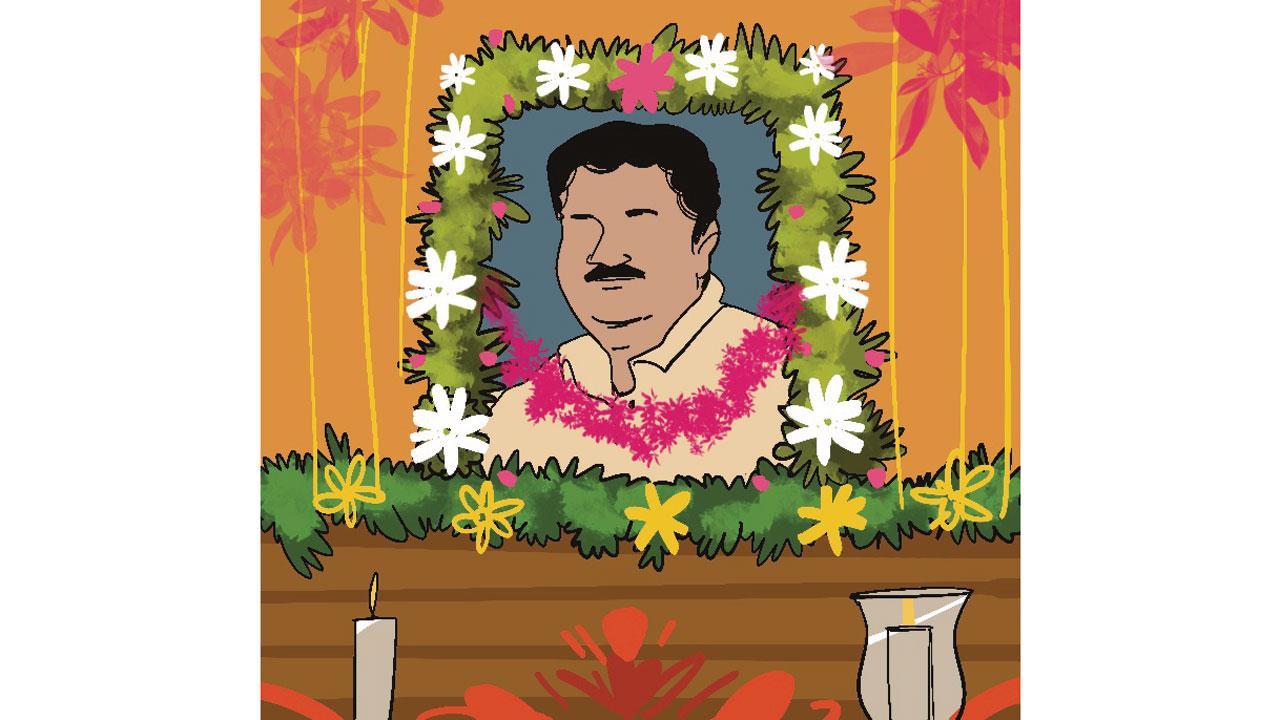But I don’t think it’s only Covid-19 that has changed everything

Illustration/Uday Mohite
![]() There’s no best way to deal with death. You’re bludgeoned. You’re in shock. You cope as well as you can, going through the motions of rituals or daily routines, while trying to grapple with the void inside you. And there have been so many deaths of late. Some funerals you can attend. But, increasingly, e-funerals come to you via a Zoom link, and instead of condoling with the family, you’re fiddling with the viewing buttons on your laptop, to locate and ‘pin’ the speaker from 100 stamp-sized headshots of mourners on your screen, because he’s mumbling with grief and you’re trying to lip-read. But I don’t think it’s only COVID-19 that has changed everything. I think India’s relationship with death had changed radically way before it arrived.
There’s no best way to deal with death. You’re bludgeoned. You’re in shock. You cope as well as you can, going through the motions of rituals or daily routines, while trying to grapple with the void inside you. And there have been so many deaths of late. Some funerals you can attend. But, increasingly, e-funerals come to you via a Zoom link, and instead of condoling with the family, you’re fiddling with the viewing buttons on your laptop, to locate and ‘pin’ the speaker from 100 stamp-sized headshots of mourners on your screen, because he’s mumbling with grief and you’re trying to lip-read. But I don’t think it’s only COVID-19 that has changed everything. I think India’s relationship with death had changed radically way before it arrived.
ADVERTISEMENT
When I was younger and we went to funerals, people would weep and wail freely, mourn, embrace and comfort each other, with fresh howls of grief going up with each family that arrived, as the details of how it happened were recounted yet again. It was all natural, spontaneous and dishevelled; people wore what they wore; sat in huddles on the floor, struggling to come to terms with their loss, aching that they had not visited more often. And then I attended a few Gujarati and Punjabi prayer/memorial meetings, and was gobsmacked how everything was event-managed in an enormous hall, ‘handling’ over a thousand mourners with clockwork precision. One of them was a formal affair, with an emcee at the mike, and an airbrushed, smiling framed photograph of the deceased, surrounded by elegant white
liliums and rajnigandha on a table, at centre stage. The family of the deceased sat symmetrically on either side of it, all dressed in brand new, white, chikankari kurta pyjamas/salwar kameezes; not a smidgen of grief was allowed to stain their clothes. They had even hired a professional singer who sang sad Mukesh songs from a corner of the stage. Good god, I thought, will Bollywood never leave our side, even in grief? A pretty air hostess-type in a white sari helped old ladies to their seats, and offered water bottles and tissues to guests. Other bouncer-type minders firmly took your elbow, instructing you, “Sorry, you cannot meet the family now. Please be seated in the back rows until the entire ceremony is over.” After the function was over, the family of the deceased stood on stage, and everyone lined up in a queue, as Indians do at wedding receptions, to condole with the family for a few seconds, with folded hands and a mumbled ‘sorry,’ before an Uncleji herded you away.
In another instance, the WhatsApp message said, “We are having a prayer/memorial meeting for Ma. We are not doing anything religious, only singing Ma’s favourite Rabindra Sangeet songs. There will, of course, be remembrances. If you want to say anything about your memories with Ma, please feel free. Zoom link…” There was an admin, alert about your “raised hand” symbol, who gently let you know in the chat box when it was your turn to speak. Many people from all over the world shared memories and songs, that were both moving and beautiful. In person, the memorial could have been rather emotionally and physically charged, as the family processed both intense rage and grief, as their mother died of lack of oxygen, because of callous mismanagement by the administration, during one of COVID-19’s early devastating waves, and then joined a long queue at the cremation ground, where bodies were being burnt in the parking lot. But attenuated through the IV of a distant Zoom link on my laptop, it was a sublimated experience, with no way to embrace them tightly, or help calm the roiling in their hearts.
And in Bombay, I have also witnessed, as children grow up and go away, those struggling the most with their grief, are not so much the distant family, as the cooks, maids and caretakers of the deceased, precious nurturers of the everyday.
Meenakshi Shedde is India and South Asia Delegate to the Berlin International Film Festival, National Award-winning critic, curator to festivals worldwide and journalist.
Reach her at meenakshi.shedde@mid-day.com
 Subscribe today by clicking the link and stay updated with the latest news!" Click here!
Subscribe today by clicking the link and stay updated with the latest news!" Click here!








